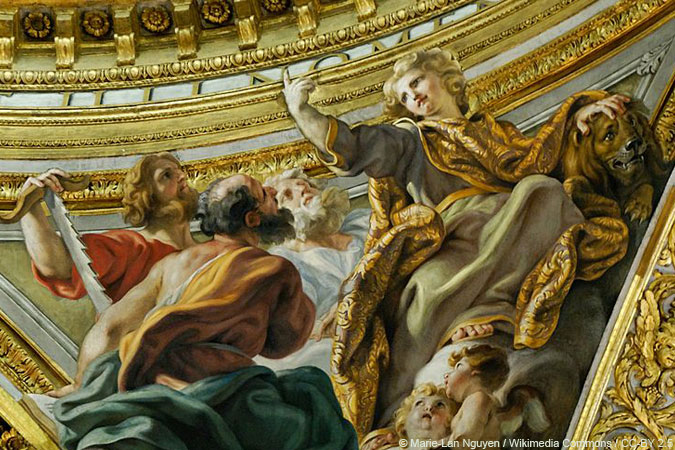
This is the final article in a series about figures in Salvation history and their relevance for catechists.
What is a prophet? The word prophet means “to speak for.” A prophet, then, is someone who speaks for God. When God wanted to speak to his people, he often chose someone to remind them of the covenant and its promises. Catechists can help students get to know these important spokespersons for God so they can become prophets themselves.
The books of prophets in the Bible describe the lives and prophesies of some of Israel’s greatest prophets. (Not every prophet has a named book in the Bible. Abraham, Moses, Elijah, and John the Baptist are other examples of people who spoke for God.) Isaiah, Jeremiah, Ezekiel, and Daniel are known as the Major Prophets. Hosea, Joel, Amos, Obadiah, Jonah, Micah, Nahum, Habakkuk, Zephaniah, Haggai, Zechariah, and Malachi are known as the Minor Prophets. The word major does not mean that these prophets were more inspired than the others; it simply refers to the significance and breadth of their prophecies and their roles in Salvation history.
The Major Prophets
Isaiah lived about 700 B.C. in Jerusalem, when Israel was divided into two kingdoms: a northern kingdom (Israel) and a southern kingdom (Judah). Isaiah was called by a vision, yet he still felt unworthy: “I am a man of unclean lips,” he cries in Isaiah 6:5. In earlier chapters of the Book of Isaiah, the prophet warns of the fall of Israel, but later he pivots to hope, speaking of a child who will save the people. During Advent we hear Isaiah’s message of hope: “Comfort, O comfort my people, / says your God. / Speak tenderly to Jerusalem, / and cry to her / that she has served her term, / that her penalty is paid, / that she has received from the LORD’s hand / double for all her sins.” (Isaiah 40:1–2)
Jeremiah, sometimes called “The Weeping Prophet,” warned of the coming destruction of Israel because of the sins of the people. Though he attempted to call Israel back to the covenant, he saw the Babylonians destroy Jerusalem. While Jeremiah’s message may have been one of bitterness and sorrow, he does portray a hopeful vision of the future.
Many of Ezekiel’s prophesies foreshadowed the Incarnation of Jesus. His vision of the closed gate (Ezekiel 44:1–3), for example, represents the Virgin Mary, and the prince described in that vision refers to Jesus. When Ezekiel delivers God’s message about the restoration of the land of Israel (Ezekiel 36), we recognize the Sacrament of Baptism in verses 25 and 26:
I will sprinkle clean water upon you, and you shall be clean from all your uncleannesses, and from all your idols I will cleanse you. A new heart I will give you, and a new spirit I will put within you; and I will remove from your body the heart of stone and give you a heart of flesh.
We hear these words during the Easter Vigil because of their connection to Baptism.
Daniel was a visionary during the Babylonian exile, who wrote of the triumph of God at the end of time. The Book of Daniel is an example of apocalyptic literature, which uses symbols and hidden meaning to look ahead to a time when God would restore Israel and Israel’s enemies would be punished by God. (Parts of Isaiah and Ezekiel are other examples of apocalyptic literature.) The Book of Daniel describes the end of time, when the Lord vindicates Israel. In Daniel we hear the term “Son of Man,” a title Jesus used for himself.
When teaching the prophets, teach about who they were, when they lived, and the historical context of their prophecies. Help the students locate the books of prophets in the Bible and know their basic messages. Most importantly, help your students recognize how they are prophets today by asking them to reflect on the following questions.
- How does God call you to speak out when you see sin and injustice? Do you have courage to do that? Remind students that the prophets spoke up against the injustice they witnessed in their day.
- How is God’s covenant still important today? How do you show God you want to keep it? The prophets pointed out how the people needed to remember the promises of the covenant.
- How do you point to Jesus? How can you show others how important he is? As Christians, we understand that the prophets all foreshadowed the coming of Jesus.
- How hopeful are you? Does believing in Jesus give you hope of heaven? In the end, the prophets’ messages were always hopeful ones.
How do you share the stories of the prophets in your classroom? How do you help your students recognize their call to be prophets today?
Image (cropped): © Marie-Lan Nguyen / Wikimedia Commons /
Read the other articles in the Biblical Literacy for Catechists series.
The sixth-grade program of the Christ Our Life series is devoted to the study of God’s saving love as it is revealed in Sacred Scripture, particularly the Old Testament. The book is designed to help the students increase their knowledge of Salvation history so that they may respond to God with ever-deepening love and gratitude.



![Call of Abraham - by the Providence Lithograph Company (http://thebiblerevival.com/clipart/1907/gen12.jpg) [Public domain], via Wikimedia Commons](https://catechistsjourney.loyolapress.com/wp-content/uploads/2017/09/call-of-abraham.jpg)
Be the first to comment